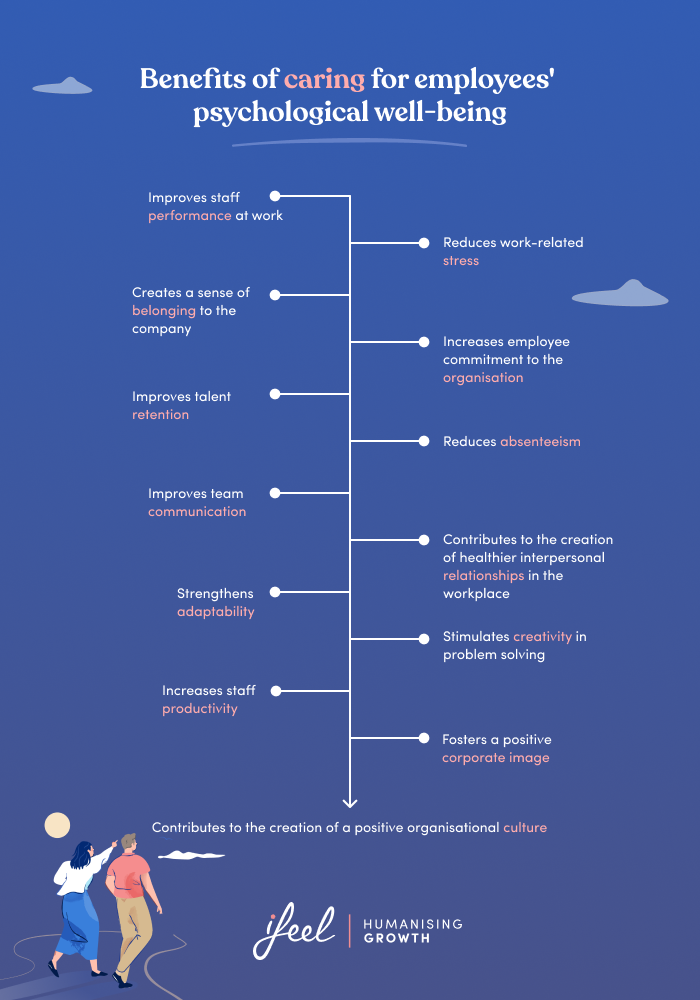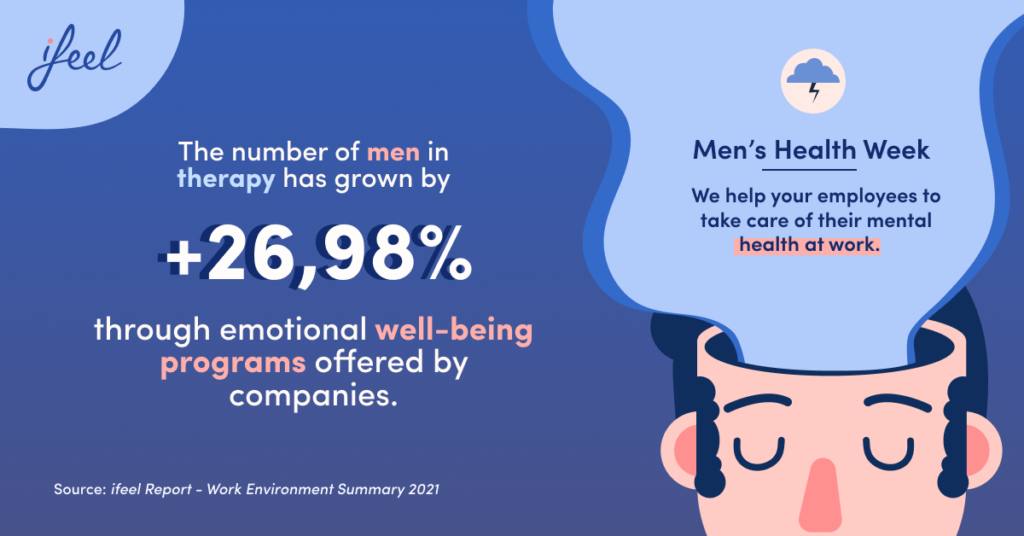A workplace well-being program, designed by professionals and with actual implementation among employees, is the best tool to take care of the people who make the mission of the organizations they work for possible every day.
Companies that want to make a difference are transforming their vision of the importance of employees’ psychological well-being. Awareness of employee needs is improving employee quality of life and production strategies.
Do you want to increase your company’s performance, are you concerned about the working environment of your employees, or do you need to improve your social benefits strategy? At ifeel, we can provide you with the right tools through our workplace well-being program to respond to these objectives simply, comfortably, and professionally.
Is it compulsory for companies to have a workplace well-being program?
Not exactly, although they must carry out concrete and effective actions aimed at preventing and addressing the effect of the main psychosocial risk factors that can affect employees. Having a workplace well-being program such as the one offered by ifeel is the best way to do this.
What are the main benefits of caring for employees’ psychological well-being?
Employees who enjoy good psychological health are more committed to their company, more motivated with their work, and more involved in the performance of their tasks. They feel that work is not an obstacle to their quality of life. They form cohesive teams and contribute to the organization’s success.
How does ifeel’s workplace well-being program help companies?
Through different resources (emotional diary, audio, articles, and other exercises), the emotional support service with a psychologist from our team, and, of course, the online therapy service. Personalized, data-driven advice is also offered to HR managers to help them improve their teams’ lives.
Is it essential for employees to undergo psychological therapy?
No, counseling is never a must for employees: the person doing it must need it, be motivated, and be committed to it. However, a complete workplace well-being program offered by companies should facilitate access to psychological therapy with a professional for those employees who want it.
In addition to the economic salary, a valuable way to take care of your employees is to offer them the tools to take care of their well-being without moving from home through their computer or cell phone. This way, they will perceive the company as an emotionally safe place.
Companies that value their employees the most strive to improve the emotional rewards they offer them. Supporting employees through their life transitions, for example, when it comes to parenthood, is critical to their well-being. Still, companies must go further to make life, and therefore work, easier for them.
Thanks to the evolution of IT and AI tools, more and more organizations can place their employees’ psychological well-being at the heart of their production strategy as a result of implementing a workplace well-being program.
In ifeel, we have a team made up of hundreds of psychologists specialized in different models, able to work in various languages, and located in different countries. This allows us to offer the necessary support, whatever the reason for the patient’s query, thus facilitating the success of our partner companies.
Have you ever thought about how much it can increase their commitment and motivation at work? With ifeel’s workplace well-being program, our psychologists can provide your employees with highly specialized care daily. In addition, HR managers receive data-driven advice on critical aspects of the well-being of the teams they are responsible for.
Key tools to boost employees’ emotional well-being
A workplace well-being program must also include a number of accessible resources, not just for managers but for employees too. To help managers and HR managers foster their employees’ mental health and emotional well-being, it is important to identify what triggers employees and how these issues can be tackled. Ifeel has created two resources for employees to fill out and take an active role in keeping their well-being at an optimal level.
1. Wellness Action Plan (WAP)
A WAP is a guide for both managers and employees. A WAP can help address work-related mental health issues or act as a preventative tool if issues have not emerged (yet). It is a confidential document that is only filled out by employees and managers. Ifeel’s WAP includes a number of questions that the employee can fill out to explain their well-being triggers, as well as the actions they think they should take in order to foster their well-being. Consequently, there is a section for managers where they fill out what actions they think their employees can take or what the company can do to support the employee. In addition, there are tips to stay healthy at work and definitions the employee can use to describe how they feel.
2. Wellness Action Recovery Plan (WRAP)
Unlike the WAP, the WRAP is a completely confidential document that the employee can choose to share or not with their manager or HR manager. This tool includes a guide on how to approach and address well-being issues proactively. It is divided into three core areas:
– Action plan
– Crisis plan
– Post-crisis plan
Each section contains a number of exercises the employee can fill out (with examples if they are unsure how to answer or what to write). It also helps them identify certain signs or situations that warn them that something is wrong.
Why have a workplace health and well-being program?
As stated in a report by Mind Charity, “1 in 6 workers is dealing with a mental health problem such as anxiety, depression, or stress”. This is a worrying statistic as it is likely that people who suffer from mental health problems at work also do outside the workplace. Therefore, it is crucial to support these employees in their emotional well-being through a workplace well-being program, as it will also affect their overall performance. “If you take proactive steps to create a more open and supportive culture, overtime staff should begin to feel more confident to talk to managers about their mental health”.
According to the Mental Health Foundation, “12.7% of all sickness absence days in the UK can be attributed to mental health conditions”. Having a preventative approach is a key factor when tackling mental health issues in the workplace. If organizations can prevent problems from arriving in the first place, they can save a large number of costs which go hand in hand with mental health sick leave.
Providing people with tools to enhance their psychological health in a cross-cutting way, outside and inside the workplace, is unavoidable in implementing a long-term sustainable productivity strategy.
Ifeel’s workplace well-being program is designed to accompany you until we find the best way to take care of your employees’ quality of life in the way they need right now. You can contact us today, and we will get to work.

Join the global leading solution in mental well-being
What’s an Employee Assistance Program?
An Employee Assistance Program (EAP) is a workplace well-being program implemented by companies to offer support and tools to their employees who have issues which are related to their mental health and well-being, which leads to issues both inside and outside the workplace. The overall objective of giving employees access to an EAP is to enhance individuals’ quality of life by safeguarding their physical and mental health in the workplace.
These are the benefits of implementing an EAP:
– Improved performance and productivity
– Increased commitment to work
– Reduces absenteeism
– Prevents work fatigue
– Avoids talent flight
HR KPIs
More and more companies implement a workplace well-being program. This shows that employees are either asking for help or it is something HR managers are noticing (whether it is in their feelings or performance). HR KPIs are indicators that HR managers and their teams use to benchmark different elements of work and life in the company. Process improvement is the primary means of improving results. It is best to do this by specifically and explicitly stating our objectives (results) and what indicators will show that we have achieved them. Some key features in HR KPIs include: specificity, making them easy to interpret, diversity, and significance.
HR managers must target their efforts specifically and strategically by establishing Objectives and Key Results (OKRs) that address employees’ emotional well-being. By setting both qualitative and quantitative goals, evaluating these objectives can be more effective. With the help of this OKR guide, HR managers can facilitate their efforts to improve the emotional well-being of their employees.
Preventing psychosocial risks
The policy of preventing and addressing psychosocial risks at work is becoming increasingly stringent. According to the Ministry of Labor, various psychosocial factors must be taken into account as job characteristics that influence employees’ psychological well-being. Among these characteristics would be, for example, the workload and pace of work or the capacity for professional development within the company.
On the other hand, we can also take into account other psychosocial aspects that influence the health of the employee and, therefore, the company’s health: relationships between colleagues, leadership style, work methodology, communication management, sense of belonging to the company and, of course, environmental and ergonomic factors at work.
In the absence of adequate identification and prevention measures, employees may be subjected to varying degrees of risk concerning these psychosocial factors, potentially harming their psychological well-being due to work-related causes.
| Some sources of psychosocial risks in the workplace | ||
| 1. | Task features | Degree of danger or complexity, ability to motivate the worker. |
| 2. | Organisation and methodology | Team coordination, efficiency of processes, leadership of those responsible, quality of internal communication. |
| 3. | Work environment and quality of relationships | Team cohesion, trust and cooperation. |
| 4. | Working conditions | Salary, material resources, time availability, job location, perception of insecurity of physical health. |
Some sources of psychological risks at work
1. Task characteristics: degree of danger or complexity, ability to motivate the worker.
2. Organization and methodology: team coordination, the efficiency of processes, the leadership of those responsible, and the quality of internal communication.
3. Work environment and quality of relationships: team cohesion, bonds of trust, and cooperation.
4. Working conditions: salary, material resources, time available, workplace location, perception of insecurity for physical health.
How to prevent psychosocial risks with a workplace well-being program
In the end, trying to control psychosocial risks at work consists of taking care of the perception that an employee has of themselves as a company member.
To achieve this, it is essential to design an effective strategy aimed at implementing decisions on prevention and addressing the mental health problems that work can generate among employees. This strategy must result from a corporate culture that includes caring for employees’ psychological health among its core values.
Therefore, organizations must take responsibility for preventing the appearance of psychosocial risk factors that may affect their workers through all the tools at their disposal.
One of them is to have a workplace well-being program made up of psychologists who are experts in these issues.

Leaders in the best workplace well-being program
Taking care of employees’ psychological well-being is a challenge for any company and a necessity, which has been very evident since the pandemic’s beginning. Organizations have had to activate rapid and drastic adaptation mechanisms to meet this challenge. Ifeel is the ideal workplace well-being program to support organizations and people in this process.

He knows perfectly well that professional performance is human performance in all other aspects of life. Therefore, the benefits of implementing a workplace health and well-being program will lead to enhancing people’s emotional well-being, which is the key to the success of any work team.
At ifeel, we offer our global emotional well-being service for companies, designed by our team of expert psychologists in well-being at work. This collaboration allows managers in People, Talent, and Human Resources to receive personalized and data-based advice on how to take care of the psychological well-being of the teams they are in charge of.
Do you belong to your organization’s Human Resources department? Try our program now to see how it could help you.
In addition, our program offers all employees a complete mental health care service that includes emotional support and online therapy with one of our professionals.
Don’t forget our Resources section! You can find different materials, such as Podcasts and HR Guides on various topics (for example, a workplace well-being glossary, a guide to preventing burnout, or how to properly approach OKRs from an HR manager’s point of view). You also have interviews with leading HR managers. Additionally, we have a Psychosocial Risk Factors Template, which you can use to comply with the requirements of the Labor Inspection.
We hope you found this post about our workplace well-being program interesting and useful. If you would like more information about our emotional well-being program for companies, simply request it, and we will contact your team as soon as possible.









